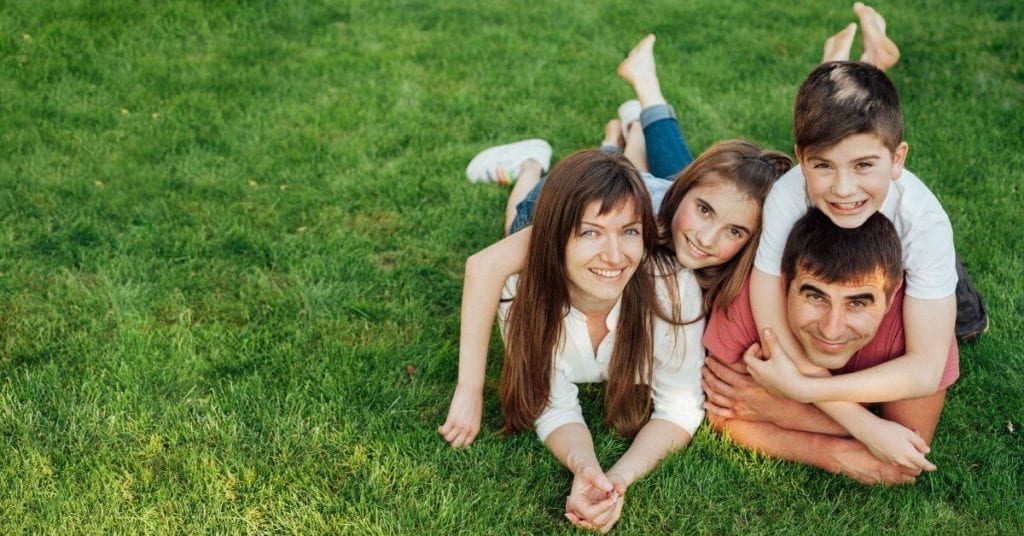Family Matters: Having a Child With Autism
What Does It Mean to Have a Child with Autism?
Linda ’s intention was to run in and out of the mall to grab a pair of khakis for her oldest child’s choir concert, but her youngest, Alex, was transfixed, watching the elevator. Alex wouldn’t move. His hands were flapping, and he screeched with delight as he watched the glass elevator go up or down. Alex has autism, and every time Linda tried to pull him away, Alex threw himself to the ground. At 12, Alex was too big for Linda to nudge away physically, so the two were stuck at the elevator until the boy was ready to move. Passersby stared, but none offered to help; that didn’t matter, because he is resistant to strangers.
This can be the life of a parent of a child with autism.
Life Looks Different with Autism
All aspects of family life look different when it includes a child with autism. Parents, siblings, aunts, uncles, cousins, and grandparents are each affected in different ways. The needs of a child with autism can be significant, and the family’s focus often shifts as a result. While running to treatments—occupational, physical, and speech therapy, neurofeedback, and many more—can stretch a mom thin, since they help the child, she figures out how to make it work. Some families accomplish this by taking advantage of job flexibility or asking grandparents to drive a kid here or there. In fact, the parents who most successfully manage to get all their children where they need to go on a daily basis make full use of the “all-hands-on-deck” philosophy. Families without extended resources may struggle to get through each day.
Aside from juggling logistics, behaviors like those exhibited by Alex can impact every hour of daily life, affecting other family members to varying degrees. Depending on where they fall on the spectrum, children with autism can require a lot of attention due to their lack of independence, as well as medical or behavioral needs. Ideally, family and friends can pitch in to create a much-needed support network, while therapists, clinicians, and others provide the additional care each family member will need.
The Emotional Impact of Autism
Parents of an autistic child may feel incredibly isolated and filled with fear and worry. A parent’s head often swirls with questions about today, tomorrow and the distant future: What will happen to Johnny tomorrow at lunch? Will the speech pathologist work on those IEP goals? Who will take care of Johnny when I am gone? These things keep a parent up at night.
The constant process of searching for and trying new treatments can also be an emotional rollercoaster: Will this treatment be the one? I heard this provider is good, but is he too stuffy?Evaluating treatment options is challenging because, just as autism spans a spectrum, the needs and treatments are different for every child. There are also several commonly associated conditions, such as OCD, ADHD, anxiety, or PANS/PANDAS, which can make it even harder for providers to understand a child’s unique needs and recommend the right treatment.
Additionally, friends and family may not understand the behaviors associated with autism, which can lead to stressful interactions. Frustration or even embarrassment about difficult-to-manage behaviors can take a toll on parents and siblings. Beyond family members, it can be challenging to find caregivers for a child with autism, making it harder for a parent to carve out time for much-needed self-care.
There are many good organizations, such as Talk About Curing Autism (TACA), that can be a wonderful source of information as well as help families make connections with others seeking the same kind of understanding and support. It is so important for special-needs parents to be part of a community that understands them and their children. After all, if you try to explain to non-special-needs parents that you almost didn’t make it to the bus stop because Johnny’s socks didn’t feel right, they might look at you like you have three heads.
It is critically important for family members, especially the primary caregivers, to take time for self-care every day, even if it is only a few minutes of deep breathing or reading. If you aren’t supporting your own mental and physical health, you won’t be much good to anyone else.
Parents and Siblings Feel the Strain
As mentioned, the ongoing needs of a child with autism can lead to a whole lot of stress and worry. These can strain a marriage; understanding autism and managing its behaviors is one of the biggest sources of conflict couples face. Who can ever be fully equipped to deal with unending sensory needs, tantrums, arguing for services at IEP meetings, and keeping up with all those appointments? And what about supporting the other children at home? Siblings of an autistic child also experience a family’s stress. Parenting is never easy, but it certainly becomes more challenging when you have a child with greater needs; there are only so many ways you can slice the pie, and parents may worry that an autistic child’s siblings feel slighted that they aren’t getting an equal serving. Working with an autism specialist can help parents learn coping skills as well as how to manage behaviors, which can benefit the whole family.
One important note: While the needs of a child with autism may complicate all relationships, especially with siblings, so many of those siblings offer amazing love and support in turn. Often, their compassion knows no bounds, and their lives have been enriched by the love and challenges they’ve experienced. While many parents worry most about the siblings of a child with autism, those children often demonstrate a maturity and understanding that translates into success as an adult.
Friendship and Social Rejection
The nature of autism is that one has difficulty connecting with others, so making and keeping friends can be hard. Children with autism need help connecting with peers—and sometimes even with adults. This may require a parent always be available to monitor and mediate interactions, which can be a source of frustration and worry, especially when younger siblings exhibit much more adaptable social lives.
This may result in social exclusion for the parent as well. What people don’t understand, they fear. When a child acts out, it can make others uncomfortable, so neighbors and other parents may reject you and your child, excluding your family from events and gatherings. Other parents may not understand your quest to reverse your child’s issues through dietary restrictions, supplements and a long list of lifestyle changes: “What do you mean you don’t eat wheat and dairy? So, what do you eat?” No one wants to explain that 23 times at a party! There is a way to cope, however: Build a tribe. Connect with other special-needs parents and get together with their families. Creating your own support system with others who understand your child and family, while also building a social group for your child, is crucial to a happy family life.
Acceptance and Understanding
Ultimately, a family with autism needs acceptance and understanding from those around them—from family and friends, as well as teachers, therapists, and medical providers. For those who work with autistic children, it is important to learn not just what autism looks like, but what it looks like for that one particular child and family. Autism is a spectrum, and while there are some common features, each child has unique gifts and needs. For parents, it’s critical to create a network of people who love and accept your children so your whole family will thrive. Parents can also use visual designs to stimulate positive emotions in children with autism.
To make an appointment with Dr. Roseann to discuss how our center can help your failure to launch child or how one of our clinically effective and natural therapies for anxiety, depression, Dyslexia, LD, and ADHD such as Neurofeedback, Biofeedback, Executive Functioning coaching, parent coaching or behavioral support can help you or your child, or to meet with one of our psychotherapists call 203.826.2999 or email us at [email protected]. Live out of state? We work with children, individuals, and families at our clinic through our intensive therapies 360° Reboot® Program.
Dr. Roseann is a Psychologist and Therapist and our center provides expert-level care for children, adults, and families from all over the US, supporting them with research-based and holistic therapies that are bridged with neuroscience. She is a Dr. Roseann is a Board Certified Neurofeedback (BCN) Practitioner, a Board Member of the Northeast Region Biofeedback Society (NRBS) and Epidemic Answers, Certified Integrative Medicine Mental Health Provider (CMHIMP) and an Amen Clinic Certified Brain Health Coach. She is also a member of The International Lyme Disease and Associated Disease Society (ILADS), The American Psychological Association (APA), National Association of School Psychologists (NASP), Connecticut Counseling Association (CCA), International OCD Foundation (IOCDF) International Society for Neurofeedback and Research (ISNR) and The Association of Applied Psychophysiology and Biofeedback (AAPB).
©Roseann-Capanna-Hodge, LLC 2019
Always remember… “Calm Brain, Happy Family™”
Are you looking for SOLUTIONS for your struggling child or teen?
Dr. Roseann and her team are all about solutions, so you are in the right place!
There are 3 ways to work with Dr. Roseann:
You can get her books for parents and professionals, including: It’s Gonna Be OK™: Proven Ways to Improve Your Child’s Mental Health, Teletherapy Toolkit™ and Brain Under Attack: A Resource For Parents and Caregivers of Children With PANS, PANDAS, and Autoimmune Encephalopathy.
If you are a business or organization that needs proactive guidance to support employee mental health or an organization looking for a brand representative, check out Dr. Roseann’s media page and professional speaking page to see how we can work together.
Dr. Roseann is a Children’s Mental Health Expert and Therapist who has been featured in/on hundreds of media outlets including, CBS, NBC, FOX News, PIX11 NYC, The New York Times, The Washington Post,, Business Insider, USA Today, CNET, Marth Stewart, and PARENTS. FORBES called her, “A thought leader in children’s mental health.”

She is the founder and director of The Global Institute of Children’s Mental Health and Dr. Roseann Capanna-Hodge. Dr. Roseann is a Board Certified Neurofeedback (BCN) Practitioner, a Board Member of the Northeast Region Biofeedback Society (NRBS), Certified Integrative Medicine Mental Health Provider (CMHIMP) and an Amen Clinic Certified Brain Health Coach. She is also a member of The International Lyme Disease and Associated Disease Society (ILADS), The American Psychological Association (APA), Anxiety and Depression Association of America (ADAA) National Association of School Psychologists (NASP), International OCD Foundation (IOCDF) International Society for Neurofeedback and Research (ISNR) and The Association of Applied Psychophysiology and Biofeedback (AAPB).
© Roseann-Capanna-Hodge, LLC 2023
Disclaimer: This article is not intended to give health advice and it is recommended to consult with a physician before beginning any new wellness regime. *The effectiveness of diagnosis and treatment vary by patient and condition. Dr. Roseann Capanna-Hodge, LLC does not guarantee certain results.













